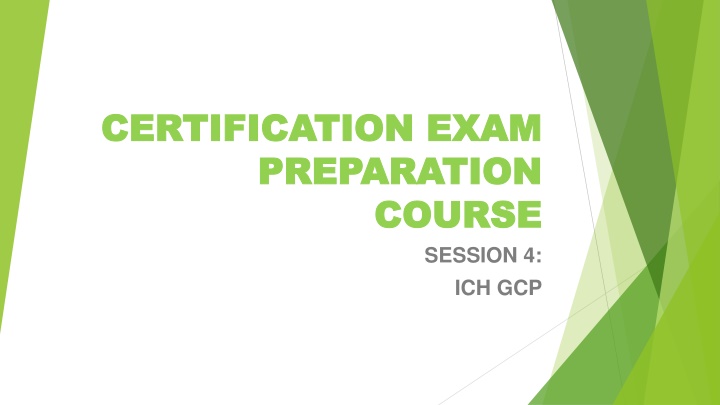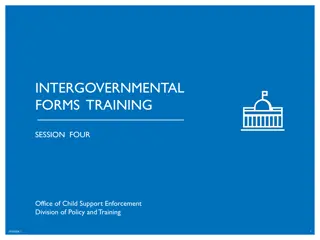
ICH GCP Principles and Guidelines
Explore the essentials of Good Clinical Practice (GCP) with a focus on International Council for Harmonisation (ICH) guidelines. Learn about key roles, responsibilities, and ethical standards in clinical research to ensure quality and integrity.
Download Presentation

Please find below an Image/Link to download the presentation.
The content on the website is provided AS IS for your information and personal use only. It may not be sold, licensed, or shared on other websites without obtaining consent from the author. If you encounter any issues during the download, it is possible that the publisher has removed the file from their server.
You are allowed to download the files provided on this website for personal or commercial use, subject to the condition that they are used lawfully. All files are the property of their respective owners.
The content on the website is provided AS IS for your information and personal use only. It may not be sold, licensed, or shared on other websites without obtaining consent from the author.
E N D
Presentation Transcript
CERTIFICATION EXAM CERTIFICATION EXAM PREPARATION PREPARATION COURSE COURSE SESSION 4: ICH GCP
Handout/Reference sheet: ICH GCP Principles Worksheets: ICH GCP E6 (R2) ICH GCP E6 (R2) section 4 Webinar to review: Research 101, session 3
What is GCP? GCP is defined as a standard for the design, conduct, performance, monitoring, auditing, recording, analysis and reporting of clinical trials or studies AN ATTITUDE OF CREDIBILITY AND EXCELLENCE IN RESEARCH MINDSET OF DEDICATION FOR QUALITY MORE THAN RULES ON A PIECE OF PAPER A COLLECTION OF PRACTICES TO ASSURE SUBJECT SAFETY/PROTECTION OF RIGHTS A WAY TO PROVIDE A STANDARD FOR RESEARCH AND PREVENT MISCONDUCT IF FOLLOWED, PRODUCES ETHICAL STUDIES AND QUALITY DATA
Clinical Investigators Sponsors Others Participants Study team members Independent Ethics Committees/Institution al Review Boards Research Assistants Who is Responsible? Contract Research Organizations Subjects/Participant s Research Clinical Coordinators Data entry personnel Monitors/Auditors Clinical Research Associates Medical monitors
ICH GCPs International ethical and scientific quality standard for designing, conducting, recording, and reporting trials that involve human subjects International Council for Harmonisation We will only be discussing E6 (R2) in detail today More than E6 (R2)
ICH GCPs ICH GCPs Consists of E1-E20
provides overall guidance on the clinical development lifecycle, including designing quality into clinical studies, considering the broad range of clinical study designs and data sources used ICH GCP E8 should be considered and used in an integrated, holistic way rather than focusing on only one guideline or subsection
ICH GCP E8 Sections Section 3: Designing Quality Into Clinical Studies Section 1: Objectives of This Document Section 4: Drug Development Planning Section 2: General principles Section 5: Design Elements and Data Sources for Clinical Studies Section 6: Conduct, Safety, Monitoring, and Reporting Section 7: Considerations in Identifying Critical to Quality Factors
Section 1: Provide Guidance on the Clinical Development Lifecycle, including designing quality into clinical studies, considering the broad range of clinical study designs and data sources used Section 2: Protection of Clinical Study Participants, scientific approach, patient input Section 3: Designing Quality into Clinical Studies, establishment of an appropriate framework for the identification and review of critical quality factors Section: 4 Drug Development Planning, adheres to the principles of scientific research and good study design that ensure the reliability and interpretability of results
Section 5: Design Elements and Data Sources for Clinical Studies, study objectives impact the choice of study design and data sources, study population, methods to reduce bias, statistical analysis, study data Section 6: Conduct, Safety Monitoring, and Reporting, protocol adherence, participant safety, safety monitoring, withdrawal criteria, study reporting Section 7: Considerations in Identifying Critical to Quality Factors, should be supported by proactive, cross-functional discussions and decision making at the time of study planning Annex: Types of Clinical Studies
An international quality standard that is provided by the International Conference on Harmonisation Universally recognized as a critical requirement to the conduct of research involving human subjects ICH GCP E6 (R2) Purpose: Harmonize technical procedures and standards Improve quality and speed time to market In 1997, the FDA endorsed the GCP Guidelines developed Used as guidance for the FDA/NIH
Provides a unified standard for the European Union, Japan, and the united states to facilitate the mutual acceptance of clinical data by the regulatory authorities in these jurisdictions ICH GCP E6 (R2)
ICH GCP E6 (R2) Sections Section 1 Glossary Section3 IRB/IEC Section 2 Principles Section 6 Clinical Trial Protocol/Amendments Section 5 Sponsor Section 4 Investigator Section 7 Section 8 Essential Documents Investigator s Brochure
ICH GCP E6 (R2): Section 1 Glossary 65 terms and definitions
ICH GCP E6 (R2): Section 2 Principles of ICH GCP
13 Principles of ICH GCPs 1. Ethical conduct of clinical trials 2. Benefits justify risks 5. Compliance with a scientifically sound, detailed protocol 3. Rights, safety, and well-being of subjects prevail 4. Nonclinical and clinical information supports the trial 7. Medical care/decisions by qualified physician 6. IRB/IEC approval prior to initiation
13 Principles of ICH GCPs contd 8. Each individual is qualified (education, training, experience) to perform his/her tasks 9. Freely given from every subject prior to participation 10. Accurate reporting, interpretation, and verification 13. Systems with procedures to ensure quality of every aspect of the trial 11. Protects 12. Conform to GMP s and used per protocol confidentiality of records
Sections 3-5 Section 3: IRB/IEC Section 4: Investigator Section 5: Sponsor
ICH GCP E6 (R2): Section 3 IRB/IEC
Section 3: IRB/IEC The IRB/IEC should consider the qualifications of the investigator for the proposed trial, as documented by a current curriculum vitae and/or by any other relevant documentation the IRB/IEC requests An IRB/IEC should safeguard the rights, safety, and well-being of all trial subjects. Special attention should be paid to trials that may include vulnerable subjects TheIRB/IEC should ensure that information regarding payment to subjects, including the methods, amounts, and schedule of payment to trial subjects, is set forth in the written informed consent form and any other written information to be provided to subjects. The way payment will be prorated should be specified
Section 3: IRB/IEC The IRB/IEC should consist of a reasonable number of members, who collectively have the qualifications and experience to review and evaluate the science, medical aspects, and ethics of the proposed trial. It is recommended that the IRB/IEC should include: The IRB/IEC should retain all relevant records (e.g., written procedures, membership lists, lists of occupations/affiliations of members, submitted documents, minutes of meetings, and correspondence) for a period of at least 3 years after completion of the trial and make them available upon request from the regulatory authority(ies) Only those IRB/IEC members who are independent of the investigator and the sponsor of the trial should vote/provide opinion on a trial-related matter At least five members At least one member whose primary area of interest is in a nonscientific area At least one member who is independent of the institution/trial site
ICH GCP E6 (R2): Section 4 Investigator
Section 4: Investigator The investigator should be : qualified by education, training, and experience to assume responsibility for the proper conduct of the trial thoroughly familiar with the appropriate use of the investigational product(s) aware of, and should comply with, GCP and the applicable regulatory requirements willing to permit monitoring and auditing by the sponsor, and inspection by the appropriate regulatory authority(ies) maintaining a list of appropriately qualifies persons to whom the investigator has delegated significant trial- related duties
Section 4: Investigator The investigator should be responsible for: all trial-related medical decisions communication with the IRB/IEC compliance with the protocol accountability for IP informed consent of the trial subjects records and reports premature termination or suspension of a trial
ICH GCP E6 (R2): Section 5 Sponsor
Section 5: Sponsor The sponsor should be responsible for: quality management quality assurance and quality control contract research organization medical expertise trial design trial management, date handling, and recordkeeping investigator selection allocation of responsibilities compensation to subjects and investigators
Section 5: Sponsor The sponsor should be responsible for: investigator selection allocation of responsibilities compensation to subjects and investigators information on the IP manufacturing, packaging, labeling, and coding IP supplying and handling IP record access safety information
Section 5: Sponsor The sponsor should be responsible for: adverse drug reaction reporting monitoring auditing non-compliance premature termination or suspension of a trial clinical trial/study reports multicenter trials
ICH GCP E6 (R2): Section 6 Clinical Trial Protocol and Protocol Amendment(s)
General information Background information Trial objectives and purpose Trial designs Selection and withdrawal of subjects Treatment of subjects Assessment of efficacy Assessment of safety and statistics Direct access to source data and documents Quality control and quality assurance Ethics Data handling and record keeping Financing and insurance Publication policy
ICH GCP E6 (R2): Section 7 Investigator s Brochure
ICH GCP E6 (R2): Section 7 Introduction Contents
ICH GCP E6 (R2): Section 8 Essential Documents
Be proactive Become familiar with the GCPs/Regs What Can We Do To Help Ensure Compliance? Participate in initial and ongoing training Attend research meetings Develop/Follow SOP/Policies/ Procedures
The questions for this session are asked in accordance to the ICH GCP E6 (R2) guidance
Which of the following should be included in the Informed Consent? A. The trial involves research B. Probability for random assignment to each treatment C. Study procedures D. Anticipated expenses to the subject for participation E. Subject s responsibilities
Which of the following are included in the Informed Consent? A.Any foreseeable risks B. Any benefits C. Any alternative procedures/treatments D. Compensation for injury E Demographics of the patients
Which documents do IRBs/IECs need to obtain prior to the study beginning? Protocol Informed Consent form Subject recruitment materials Case report forms Investigational Brochure Safety information Investigator s qualification (CV)
How long must an IRB/IEC retain records for each research project? A. Two years B. Three years C. Four years D. Indefinitely
The investigator should promptly report which of the following? A. Deviations from the protocol to prevent immediate harm B. Serious/unexpected adverse drug reactions C. Revisions to the protocol D. All serious adverse events
Essential documents should be retained until A. At least 2 years after the last approval of a marketing application in an ICH region B. There are no pending or contemplated marketing applications in an ICH region C. At least 2 years have lapsed since the formal discontinuation of clinical development of an IP D. Longer than 2 years if required by the applicable regulatory requirements or by an agreement with the sponsor
ICH GCP guidance was developed with consideration of the current good clinical practices of the European Union, Japan, and the United States, as well as those of Australia, Canada, the Nordic countries, and the World Health Organization. True False
The sponsor is responsible for the providing written procedures for handling and storage of the investigational product for the trial and documentation of receipt, handling, storage, dispensing, retrieval, etc. True False






















